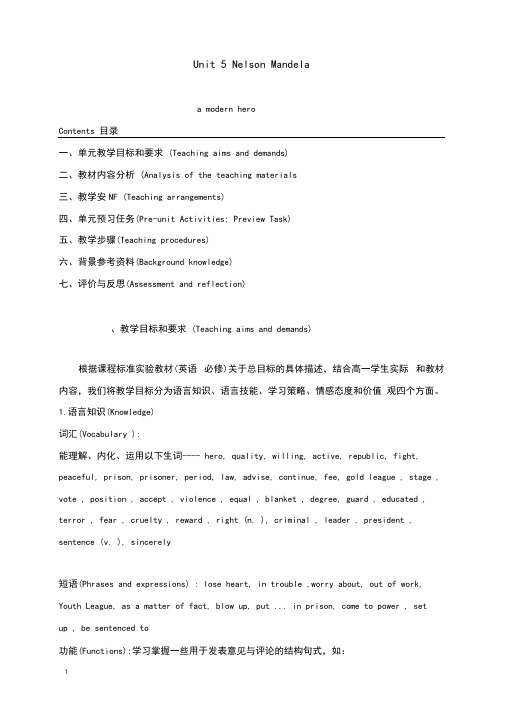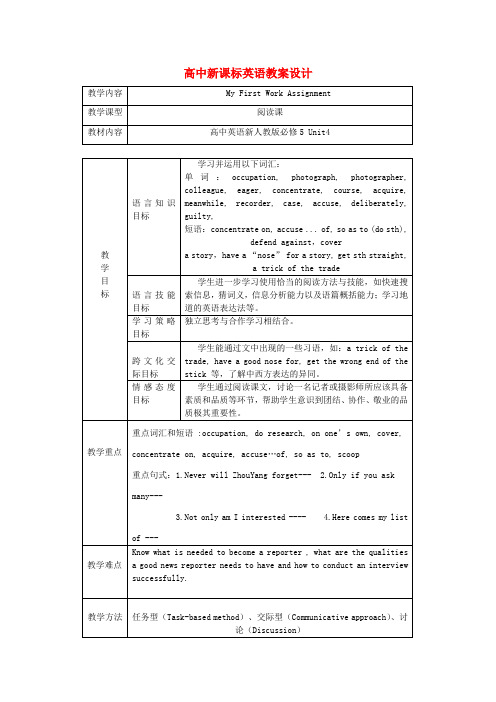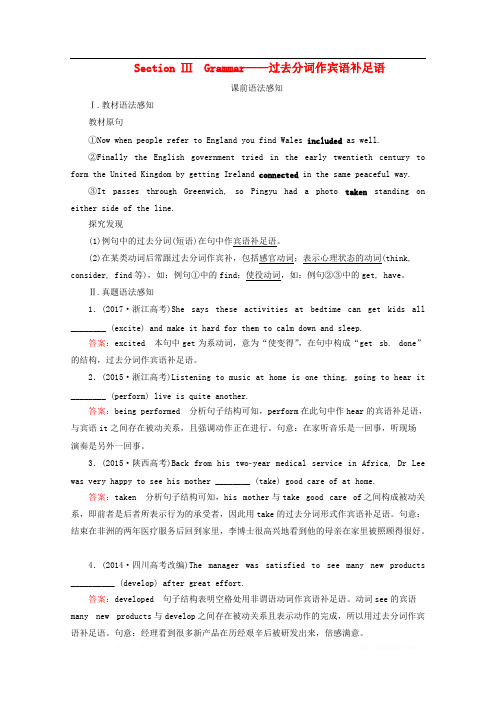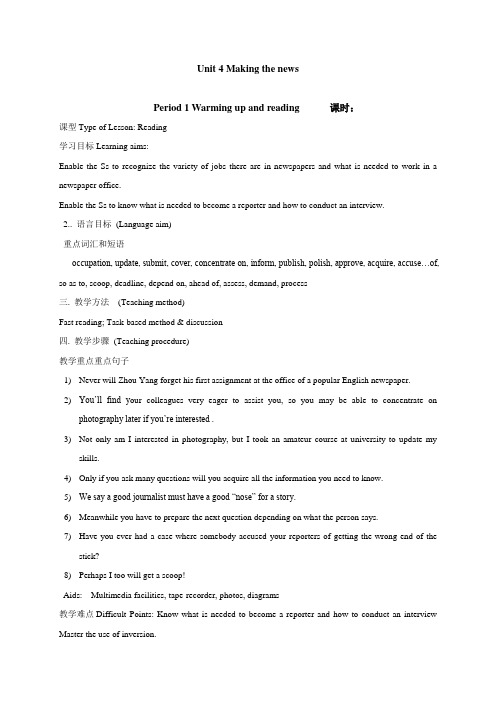人教版高中英语必修5全册教案
2019_2020学年高中英语Unit5FirstaidPeriodFourGrammar—Ellipsis教案(含解析)新人教版必修5

Period Four Grammar—Ellipsis感知以下课文原句,补全方框下的小题1.句1和句4为简单句中的省略,句1中在first和second后省略了degree;句4中在becoming 前省略了from。
2.句2,3和5为状语从句的省略。
当状语从句的主语和主句的主语一致,或当状语从句的主语为it,而且从句谓语中含有be动词时,可以把从句的主语和be动词一起省略。
一、什么是省略1.省略是一种避免重复、保持简洁的语法手段。
2.凡是缺少一个或一个以上的必要语言成分,但在一定语境中能够独立存在,意义明确,并且能发挥交际功能的句子就是省略句。
二、省略的分类(一)简单句中的省略1.省略主语:一般情况下,主语是不能省略的,但在祈使句和其他不容易引起歧义的情况下,特别是在口语中,常常省略主语,主要是祈使句中的you和疑问句中的主语。
(You) Shutup!住嘴!(It) Doesn’tmatter.没关系。
2.省略宾语:当上、下或前、后两个句子的宾语一致时,下句或后句常省略宾语。
—DoyouknowMissGao?—Idon’tknow (her).——你认识高女士吗?——不认识。
3.省略主语和谓语(或谓语的一部分):在某些具体的场合下,主语和谓语都很明确,此时为了简化或显得亲切等,可将主语和谓语(或谓语的一部分)同时省略,只剩下表语、宾语、状语或其他成分。
(Youcome) Thisway,please.请这边走。
(省略了主语和谓语)(Haveyou) Gotanyink?你有墨水吗?(省略了主语和谓语的一部分)(二)并列句中的省略一般来说,在后一并列句中凡是与上文相同的成分通常都要省略。
Myroomisonthefifthfloor,andhers (is) ontheeighth (floor).我的房间在五楼,而她的在八楼。
(三)复合句中的省略1.状语从句中的省略当状语从句的主语和主句的主语一致或从句的主语为it,且从句谓语中含有be动词时,省略状语从句中的主语和be动词。
人教版高中英语必修五第二单元教案

Period 5 GrammarThe General Idea of This PeriodThis period lays emphasis on grammar, that is, the past participle used as the object complement, which is also one of the difficult points in Senior English grammar.First, revise what the students have learnt in the last period by checking their homework , including some important phrases and translating some sentences from Chinese into English.In this unit the students should learn about the past particip le used as the object complement. First, the teacher presents one sentence containing a past participle used the object complement, which was taken from the reading passage.Teacher tries to analyze the function of the past participle and help the students have a general idea about it.Then the students are asked to find all the sentences that contain a past participle used as the object complement in the Reading passage.Then the students can come to a conclusion of the basic structure of the past participle1used as the object complement, that is, have/get/find/...+object +past participle.Next the teacher will explain the differences between the present participle and the past participle.The teacher compares them when are used as the attributive, predicate, object complement and adverbial.In order to do so, the teacher always shows some typical examples.After that, the students will find out the difference between them.Then they are provided with some exercises for them to consolidate what they have learned.In order to consolidate the grammar points, the students will do some oral practice.In this practice, the students will ask and answer some questions in pairs, using the past participle as the object complement.The students should not only learn about the grammar, but also learn how to use them, which is much more important.Also this part can help the students to communicate with each other using the language that they have learned, and this is the real purpose of learning the target languages.Teaching Important Point2Learn grammar: the past participle used as the object complement.Teaching DifficultiesKnow the differences between the present participle and the past participle when they are used as the attributive, predicate, object complement and adverbial.Learn to make a choice between the present participle and the past participle according to the different context.Teaching Aidsa tape recordera projectorthe blackboardThree Dimensional Teaching AimsKnowledge AimsLearn the past participle used as the object complement.3Know the differences between the present participle and the past participle when they are used as the attributive, predicate, object complement and adverbial.Ability AimsLearn to make a choice between the present participle and the past participle according to the different context.Learn to communicate with each other by using the language that they have learne d.Emotional AimsLearn to cooperate with each other.Teaching ProcedureStep 1 GreetingsTeacher greets the students as usual.Step 2 RevisionT: At the beginning of this period, let’s check your homework.First, please write down the4phrases according to the Chinese explanations.S: 1) 与……连结 be linked to2) 令某人惊讶的是 to one’s surprise3) 到处寻找, 观光 look around4) 睁大眼睛 keep one’s eyes open5) 在特殊的场合 on special occasions6) 为了纪念…… in memory of7) 拍一张照片 have a photo taken8) 展出 on show9) 为……感到骄傲 be proud of10) 遗留, 漏掉 leave outT: Good.Now, let’s check your translations of the five sentences.S1: When David Beckham arrived in Japan, the thrilled fans all went to meet him.5S2: In order to celebrate my cousin’s wedding, my aunt and uncle had an evening party arranged.S3: It is probably puzzling, but to set an example can help to clarify the puzzle.S3: Don’t be influenced by her words.You must decide for yourself.S4: Polar took the place of her father to treat the guests at the party, since her father was not available to.Step 3 Discovering Useful StructuresT: In the last unit we learnt about the past participle used as the attributive.Now let’s look at the following sentence taken from the passage.Please tell me what function is the past participle.Now when people refer to England you find Wales included as well.S: It is used as the object complement.T: You are right.So in this unit we will learn about the past participle used as the object complement.The structure is often formed with have /get /find/...+object +past participle.Please6find three more sentences from the reading passage with past participles used as the object complement.(After several minutes.)S1: To their surprise, the three countries found themselves united peacefully instead of by war.(Para.3)S 2: However, just as they were going to get Ireland connected to form the United Kingdom, the southern part of that country broke away to form its own government.(Para.3) S3: You find most of the population settled in the South, but most of the large industrial cities in the Midlands ad North of England.(Para.5)T: Yes, you are very clever.Now, look at Part 2 (Discovering useful structures) on Pages plete the sentences by using the words in brackets and the structure have /get /find something done.T: Let’s do No.1 as an example.We are having the house mended now.7(After several minutes.)S1: No.2 You look different today.Have you had your hair cut?S2: No.3 Do you want to get the dictionary delivered to your house or would you prefer to come to the shop for it?S3: No.4 Sorry, I haven’t had the film developed yet.S4: No.5 On my way to the station my car broke down.When I got to the repair shop I found it closed.S5: No.6 The computer doesn’t seem to work well.You’d better get it repaired.S6: No.7 Jill and Eric had all their money stolen while they were on holiday.S7: No.8 Chris had some flowers sent to Sarah on her birthday.Then Chris asked Sarah to marry hem and they had it announced in the newspaper.They had no time to arrange their own wedding, so they had it organized by a company.T: Ex cellent.Past participle used as the object complement can also be put after such words8as see, hear, notice, watch, keep, make, feel, etc.Please put the following sentences into English.1.她高兴地看到孩子们在托儿所受到很好的照顾。
最新人教版高中英语必修一unit5《nelsonmandela》全单元教案.doc

Unit 5 Nelson Mandelaa modern heroContents 目录一、单元教学目标和要求(Teaching aims and demands)二、教材内容分析 (Analysis of the teaching materials三、教学安NF (Teaching arrangements)四、单元预习任务(Pre-unit Activities: Preview Task)五、教学步骤(Teaching procedures)六、背景参考资料(Background knowledge)七、评价与反思(Assessment and reflection)、教学目标和要求(Teaching aims and demands)根据课程标准实验教材(英语必修)关于总目标的具体描述,结合高一学生实际和教材内容,我们将教学目标分为语言知识、语言技能、学习策略、情感态度和价值观四个方面。
1.语言知识(Knowledge)词汇(Vocabulary ):能理解、内化、运用以下生词---- hero, quality, willing, active, republic, fight, peaceful, prison, prisoner, period, law, advise, continue, fee, gold league , stage , vote , position , accept , violence , equal , blanket , degree, guard , educated , terror , fear , cruelty , reward , right (n. ), criminal , leader , president , sentence (v. ), sincerely短语(Phrases and expressions) : lose heart, in trouble ,worry about, out of work, Youth League, as a matter of fact, blow up, put ... in prison, come to power , setup , be sentenced to功能(Functions):学习掌握一些用于发表意见与评论的结构句式,如:1. 发表意见(Giving opinions )Why do you think so? What do you think of …? What's you opinion?agree / don't agree. I think / don't think .... I prefer .... In myopinion ....I'm afraid ....2.评论(Making comments)Good idea! That's an excellent idea .语法(Grammar):定语从句(II )(由where, when, why, 介词+ which, 介词+ whom引导的定语从句)The school where I studied only two years was three kilometres awayThis was a time when you had got to have a passbook to live in JohannesburgThe reason why I got a job was because of my hard work .•••we were put in a position in which we had either to accept we were less important, or fight the Government .The person to whomyou should be grateful for a peaceful South Africa is Nelson Mandela.扩展词汇:negative(消极的),heroine(女主角,女主人公),unwilling(不情愿的),nation(国家,民族),sacrifice(牺牲),realize (认识到),give up (放弃),riches (财富),Bible (圣经),revolution (革命),career (职业),equality (平等),fairness(公平),conflict (冲突),biography (自传),beliefs (信仰),Christianity (基督教),religion (宗教),priests (牧师),version (翻译),readable (易读的),adventure (冒险),scholar (学者),sympathy (同情),,campaign (从事活动),communist (共产主义者),injustice (不公平),oppose (反对),pilot(飞行员) , boycott (联合抵制)2.语言技能(Skills)听:在本单元的课文及练习册听力教学中,能听懂人物和事件以及它们的关系,能抓住所听语段中的关键词,正确理解话语间的逻辑关系。
高中英语 阅读课教学教案设计 新人教版必修5

教师活动
学生活动
设计意图
Teaching Procedure
Step I: Lead-in & Warming up
(5m)
1. A free talk about students’ future plans and their ideal occupations.
Tip: Whatever you want to be, you need to know a lot about the occupations and prepare yourselves for them from now on.
Q7 Has the boss ever had a case where someone accused the journalist of getting the wrong end of the stick?
How to deal with accusations of printing lies?
①语言知识目标
学习并运用以下词汇:
单词:occupation, photograph, photographer, colleague, eager, concentrate, course, acquire, meanwhile, recorder, case, accuse, deliberately, guilty,
短语:concentrate on, accuse ... of, so as to (do sth), defend against,cover
a story,have a“nose”for a story, get sth straight, a trick of the trade
2019-2020学年高中英语unit2 the united kingdom sectionⅢgrammar教学案版本:人教版必修5

Section Ⅲ Grammar——过去分词作宾语补足语课前语法感知Ⅰ.教材语法感知教材原句①Now when people refer to England you find Wales included as well.②Finally the English government tried in the early twentieth century to form the United Kingdom by getting Ireland connected in the same peaceful way.③It passes through Greenwich, so Pingyu had a photo taken standing on either side of the line.探究发现(1)例句中的过去分词(短语)在句中作宾语补足语。
(2)在某类动词后常跟过去分词作宾补,包括感官动词;表示心理状态的动词(think, consider, find等),如:例句①中的find;使役动词,如:例句②③中的get, have。
Ⅱ.真题语法感知1.(2017·浙江高考)She says these activities at bedtime can get kids all ________ (excite) and make it hard for them to calm down and sleep.答案:excited 本句中get为系动词,意为“使变得”,在句中构成“get sb. done”的结构,过去分词作宾语补足语。
2.(2015·浙江高考)Listening to music at home is one thing, going to hear it ________ (perform) live is quite another.答案:being performed 分析句子结构可知,perform在此句中作hear的宾语补足语,与宾语it之间存在被动关系,且强调动作正在进行。
人教版高中英语必修五教案:Unit 4 Making the news

Unit 4 Making the newsPeriod 1 Warming up and reading 课时:课型Type of Lesson: Reading学习目标Learning aims:Enable the Ss to recognize the variety of jobs there are in newspapers and what is needed to work in a newspaper office.Enable the Ss to know what is needed to become a reporter and how to conduct an interview.2.. 语言目标(Language aim)重点词汇和短语occupation, update, submit, cover, concentrate on, inform, publish, polish, approve, acquire, accuse…of, so as to, scoop, deadline, depend on, ahead of, assess, demand, process三. 教学方法(Teaching method)Fast reading; Task-based method & discussion四. 教学步骤(Teaching procedure)教学重点重点句子1)Never will Zhou Yang forget his first assignment at the office of a popular English newspaper.2)You’ll find y our colleagues very eager to assist you, so you may be able to concentrate onphotography later if you’re interested .3)Not only am I interested in photography, but I took an amateur course at university to update myskills.4)Only if you ask many questions will you acquire all the information you need to know.5)We say a good journalist must have a good “nose” for a story.6)Meanwhile you have to prepare the next question depending on what the person says.7)Have you ever had a case where somebody accused your reporters of getting the wrong end of thestick?8)Perhaps I too will get a scoop!Aids: Multimedia facilities, tape-recorder, photos, diagrams教学难点Difficult Points: Know what is needed to become a reporter and how to conduct an interview Master the use of inversion.教学反思Teaching Re-thinking:家庭作业Homework:教学过程Teaching Procedures:一. 教学目标(Teaching aims)1. 能力目标(Ability aim)Period 1Step I Warming up. ( see page 25 )Can you tell some jobs in a newspaper company? What are their jobs involves?Teaching suggestions: rearrange the order of the types of jobs a newspaper has and what they involve And ask the students to do the matches. Then ask them to copy what’s on the screen to their books. At the same time deal with the new words:occupation and journalist and the expression: suppose you were…occupation =a job or professionTeaching is my occupation. 教书是我的职业.。
高中英语《必修五第一单元单元词汇课》优质课教案、教学设计

教案设计(Learning about Language)部分由“词汇学习”和“语法学习”两项内容组成。
“词汇学习” 部分练习1 通过词的后缀训练名词与形容词之间的相互转换提倡学生使用词典。
练习2 选词填空练习,利用语篇集中训练本单元的一些重点词汇的用法。
练习3 是单句填空,而且所选的十个句子或是引文或是谚语。
“语法学习”部分主要是帮助学生了解、熟悉并掌握情态动词的用法,共有三项练习。
“语言运用”(Using Language)部分主要是让学生运用本单元所学的语言知识与课文内容进行听、说、读、写等的综合训练。
“听与说” (Listening and speaking); 是听前准备活动。
“读与写”(Reading and writing)主要设计是:阅读内容主要讲述一位来自高中的学生对全球变暖十分关注并向地球保护协会写了一封信询问措施。
协会给出了相当令人满意的回信。
短文后的三个问题帮助学生理解文章的内容。
写信的部分主要是要求学生根据上面阅读文章的内容通过思考写出自己的思想、自己的做法,尝试解决问题的不同途径。
教材提供给学生一些写作时要思考的问题,帮助学生完成写作构思。
“小结”(S ummin g U p)部分让学生根据所给出的提示对所学各项内容进行总结。
“学习建议”(L e a r nin g T ip)部分主要建议学生看阅读报纸,多读书多总结,以培养学生运用语言资源的能力。
五、教学重点Teaching important pointsa.The usage of language points of this unit.b.To learn to use these words.教学难点Teaching difficult pointsa.Enable students to get the hang of the language points completely.b.Get students to discuss warmly and express their own and excellent idea.教学方法Teaching methodsa.Brainstormingb.Task based language teaching.c.Individual, pair or group work to finish each task.d.Discussion.教学过程:1.concludevi.推断出vt.结束①conclude 推断出;断定conclude...with... 以...结束conclusion n .结论;结束arrive at/come to/reach/draw a conclusion 得出结论in conclusion 总而言之学生去说;学生能做的教师就不要代替学生去做;学生回答问题无论对还是错,教师不要急于评判,让学生自已去评判与总结;对发言积极的学生要及时鼓励,决不能因为他们的答案与教师的标准答案不一样就否定并伤害学生的自尊心。
2020_2021学年高中英语Unit5FirstaidSectionⅢGrammar教师用书教案新人教版必修5

Unit 5 First aid省略语境自主领悟先观察原句后自主感悟1.These burns are not serious and (they) should feel better within a day or two (days).2.If burns are on arms or legs,keep them higher than the heart,if (it is) possible.3.It shows that a knowledge of first aid can make a real difference.4.First degree burns turn white when (they are) pressed. 1.例句1为并列句,因为两个分句的主语都是These burns,故第二个分句的主语省略;介词within后的宾语中因前面有名词day,故or后的同一名词days省略。
2.例句2中的条件状语从句中含有it is,可以省略。
3.例句3中的及物动词show后接宾语从句,连接词that一般可以省略。
4.例句4中的时间状语从句的主语和主句的主语First degree burns一致,且状语从句中含有be动词时,省略状语从句中的主语和be动词。
为了避免重复,将句子中的一个或几个成分省去,这种语法现象叫省略。
省略是避免重复、突出新信息并使上下文紧密连接的一种语法手段。
英语中的省略有下列几种情况。
一、简单句的省略1.祈使句的省略。
在祈使句中,通常省略主语you。
(You) Go down this street and turn right at the second crossing.请(你)沿着这条街走,然后在第二个十字路口向右拐。
2.There be 句型的省略。
(Is there)Anything else?(还有)其他东西吗?3.疑问句的答语省略。
—Are you from America?—Yes,I am (from America).——你来自美国吗?——是的,我是(来自美国)。
- 1、下载文档前请自行甄别文档内容的完整性,平台不提供额外的编辑、内容补充、找答案等附加服务。
- 2、"仅部分预览"的文档,不可在线预览部分如存在完整性等问题,可反馈申请退款(可完整预览的文档不适用该条件!)。
- 3、如文档侵犯您的权益,请联系客服反馈,我们会尽快为您处理(人工客服工作时间:9:00-18:30)。
新课标高中英语 5(必修)教学设计与案例Unit 1 Great scientistsTeaching aimsTo help students learn to describe peopleTo help students learn to read a narration about John SnowTo help students learn to use some important words and expressionsattribute Period 1 Warming up and readingTeaching ProceduresI. Warming up Step I Lead inTalk about scientist.T: Hi, morning, class. Nice to see you on this special day, the day when you become a senior two grader. I am happy to be with you helping you with your English. Today we are to read about a certain scientist. But first let ' s define the word “ scientist ” . What is a scientist?A scientist is a person who works in science, trying to understand how the universe or other things work.Scientists can work in different areas of science. Here are some examples: Those that study physics are physicists. Those that study chemistry are chemists. Those that study biology are biologists.Step IIAsk the students to try the quiz and find out who knows the most.T: There are some great scientific achievements that have changed the world. Can you namesome of them? What kind of role do they play in the field of scie nee? Do these achieveme nts haveanything in com mon? Match the inven tio ns with their inven tors below before you an swer all these questi ons.1. Archimedes, Ancient Greek (287-212 BC ), a mathematician.5. To help students identify examples ofThe Past Participle (1) as the Predicative & the1. 2. 3. To help students better understandGreat scientists4.2. Charles Darwin, Britain (1808-1882). The name of the book is Origin of Species.3. Thomas Newcome n, British (1663-1729), an inven tor of steam engine.4. Gregor Men del, Czech, a bota nist and gen eticist.5. Marie Curie, Polish and French, a chemist and physicist.6. Thomas Edis on, America n, an inven tor.7. Leonardo da Vinci, Italian, an artist.8. Sir Humphry Davy, British, an inven tor and chemist.9. Zhang Heng, an cie nt China, an inven tor.10. Stepper Hawking, British, a physicist.II . Pre-readingStep IGet the students to discuss the questions on page 1 with their partners. Then ask the studentsto report their work. En courage the stude nts to express their differe nt opinions.1. What do you know about in fectious diseases?In fectious diseases can be spread to other people. They have an unknown cause and n eedpublic health care to solve them. People may be exposed to in fectious disease, so may ani mals,such as bird flu , AIDS, SARS are infectious diseases. Infectious diseases are difficult to cure.2. What do you know about cholera?Cholera is the illness caused by a bacterium called Vibrio cholerae. It infects people ' s intestines(肠),causing diarrhea and leg cramps (扌抽筋)The most common cause of cholera is by some one eat ing food or drinking water that has bee n con tam in ated(污染)with the bacteria.Cholera can be mild(不严重的)or even without immediate symptoms(症状),but a severe casecan lead to death without immediately treatme nt.3. Do you know how to prove a new idea in scie ntific research?Anybody might come out with a new idea. But how do we prove it in scientific research?There are seven stages in examining a new idea in scientific research. And they can be put in the follow ing order. What order would you put the seve n in? Just guess.Fi nd a problem Make up a questi on Th ink of a method Collect resultsAnalyse the resultsDraw a conclusion Repeat if necessaryIII . ReadingStep I Pre-read ing1. Do you know John Snow?John Snow is a well- known doctor in the 19th century in London and he defeated “ King Cholera ”.2. Do you know what kind of disease is cholera?It is a kind of terrible disease caused by drinking dirty water and it caused a lot of deaths inthe old times and it was very difficult to defeat.Let ' s get to know how Dr. John Snow defeated “ King Cholera ” in 1854 in London in this readi ng passage:Step II Skimming 找教案Read the passage and an swer the questi ons.1. Who defeats “ King Cholera (Joh? Snow)2. What happe ned in 1854? (Cholera outbreak hit Lon do n.)3. How ma ny people died in 10 days? (500)4. Why is there no death at No. 20 and 21 Broad Street as well as at No. 8 and 9 CambridgeStreet?(These families had n ot drunk the water from the Broad Street pump.)(Optio nal)Step III ScanningRead the passage and nu mber these events in the order that they happe ned.2 Joh n Snow bega n to test two theories.1 An outbreak of cholera hit Lon don in 1854.4 Joh n Snow marked the deaths on a map.7 He announced that the water carried the disease.3 Joh n Snow in vestigated two streets where the outbreak was very severe.8 King Cholera was defeated.5 He found that most of the deaths were n ear a water pump.6 He had the han dle removed from the water pump.Step IV Main idea and correct stage 找教案Read the passage and put the correct stages into the readi ng about research into a disease.Step V Group discussi onAn swer the questio ns (Finish exercise 2 on Page 3)1. Joh n Snow believed Idea 2 was right. How did he fin ally prove it?(Joh n Snow fin ally proved his idea because he found an outbreak that was clearly related to cholera, collected information and was able to tie cases outside the area to the polluted water.)2. Do you think Joh n Snow would have solved this problem without the map?(No. The map helped John Snow organize his ideas. He was able to identify those households that had had many deaths and check their water-drinking habits. He identified those houses that had had no deaths and surveyed their drinking habits. The evidence clearly pointed to the polluted water being the cause.)3. Cholera is a 19th cen tury disease. What disease do you thi nk is similar to cholera today?(Two diseases, which are similar today, are SARS and AIDS because they are both serious, have an unknown cause and n eed public health care to solve them.)Step VI Using the stages for scie ntific research and write a summary.Period 2&3 Language focusStep I Warmi ng up1. characteristic①n. a quality or feature of sth. or some one that is typical of them and easy to recongni ze.特征;特性What characteristics dist in guish the America ns from the Can adia ns.② a. very typical of a particular thing or of some one ' 典型性的cerSuch bluntn ess is characteristic of him.Windy days are characteristic of March.[辨析]characteristic 与character找教案characteristic 是可数名词,意为“与众不同的特征«character 表示(个人、集体、民族特有的)“性格、品质”,还意为“人物;文字” What you know about him isn ' t his real character.2. put forward: to state an idea or opinion, or to suggest a plan or person, for other people to consider 提出He put forward a new theory.The foreigners have put forward a proposal for a joint venture.An interesting suggestion for measuring the atmosphere around Mars has been put forward.☆put on穿上;戴上;增加put out熄灭(灯);扑灭(火) put up with •忍受put down 写下来;放下;put off 耽误; 延期put up 建立; 建造,put up 举起,搭建,粘贴3. an alyze: to exam ine or think about someth ing carefully in order to un dersta nd it vt.分析结果、检讨、细察A computer analyses the photographs sent by the satellite.The earthquake expert tried to analyze the cause of the earthquake occurred on May 12,2008.Let 's analyze the problem and see what went wrong.He analyzed the food and found that it contained poison.We must try to analyze the causes of the strike.☆an alysis n.分析,解析,分解4. conclude: decide that sth. is true after considering al the information you have 得出结论;推论出to end sth. such as a meeting or speech by doing or saying one final thing vt. & vi 结束,终止;We concluded the meeting at 8 o ' clockyweirt.h a praFrom his appearance we may safely conclude that he is a heavy smoker.What do you conclude from these facts?We conclude to go out / that we would go out.con clusi on n.结论arrive at a conclusion; come to a conclusion; draw a conclusion; reach a conclusionWhat conclusion did you come to / reach / draw / arrive at?From these facts we can draw some conclusions about how the pyramids were built.Step 2 Read ing1. defeat①vt. to win a victory over some one in a war, competiti on, game etc. 打败,战胜,使受挫I' ve tried to solve the problem, but it defeats me!Our team defeated theirs in the game.②n.失败,输failure to win or succeedThis means admitt ing defeat.They have got six victories and two defeats.[辨析]win, beat 与defeat①win赢得”赛事、战事、某物;后接人时,意为争取赢得…的好感或支持;说服”②beat战胜"击败"比赛中的对手,可与defeat互换We beat / defeated their team by 10 scores.They won the battle but lost many men.The local ball team won the state champi on ship by beat ing / defeat ing all the other teams.I can easily beat /defeat him at golf.He is training hard to win the race and realize his dream of beco ming a champi on at the 2008 Olympic Games.2. expert①n. some one who has a special skill or special kno wledge of a subject 专家,能手an expert in psychology an agricultural expert② a. having special skill or special knowledge of a subject 熟练的,有专门技术的an expert rider an expert job 需专门知识的工作He is expert in / at cooking. 找教案3. atte nd vt. &vi参加,注意,照料①be present at参力口attend a ceremony / lecture / a movie / school / class / a meetingI shall be atte nding the meet ing.Please let me know if you are unable to attend the conference.②attend to (on): to look after, care for, serve 伺候,照顾,看护The quee n had a good doctor atte nding on her.Dr Smith atte nded her in hospital. 治疗Are you being attended to? 接待Mother had to attend to her sick son.③attend to 处理,注意倾听attend to the matterA nurse attends to his needs.Can you attend to the matter immediately?I may be late —have got one or two things to atte nd to.Excuse me, but I have an urgent matter to attend to.[辨析]attend, join, join in 与take part in①attend 指参加会议、上课、上学、听报告等②join 指加入某组织、团体,成为其中一员③join in 指加入某种活动;表示与某人一起做某事join sb. in sth.④take part in 指参加正式的、有组织的活动,切在活动中起积极作用Only 2 people attended the meeting.He joined the Communist Youth League in 2007.Will you join us in the game?We often tale part in the after-class activities.4. expose : to show sth. that is usually covered 暴露expose sth. to the light of day 把某事暴露于光天化日之下I threatened to expose him ( to the police). 我威胁要(向警察)揭发他.He exposed his skin to the sun. 他把皮肤暴露在阳光下.The old man was left exposed to wind and rain.When he smiled he exposed a set of perfect white teeth.5. cure vt. & n. to make someone who is ill well agian 治疗,痊愈When I left the hospital I was completely cured.① cure sb of a diseaseWhen you have a pain in your shoulders, you will go to see a doctor. The doctor will cure you.The only way to cure backache is to rest.He will cure the pain in your shouldersWhen I left the hospital I was completely cured.The ill ness cannot be cured easily.Although the boy was bey ond cure, his pare nts tried to cure him of bad habits.② a cure for a diseaseAspiri n is said to be a won derful cure for the pain.There is still no cure for the com mon cold.Is there a certa in cure for cancer yet?③ a cure for sth.: to remove a problem, or improve a bad situation 解决问题,改善困境The prices are going up every day, but there is no cure for rising prices.[辨析]cure 与treat①cure主要指痊愈,强调的是结果②treat强调治疗过程,指通过药物、特别的食品或运动治疗病人或疾病,不强调结果。
